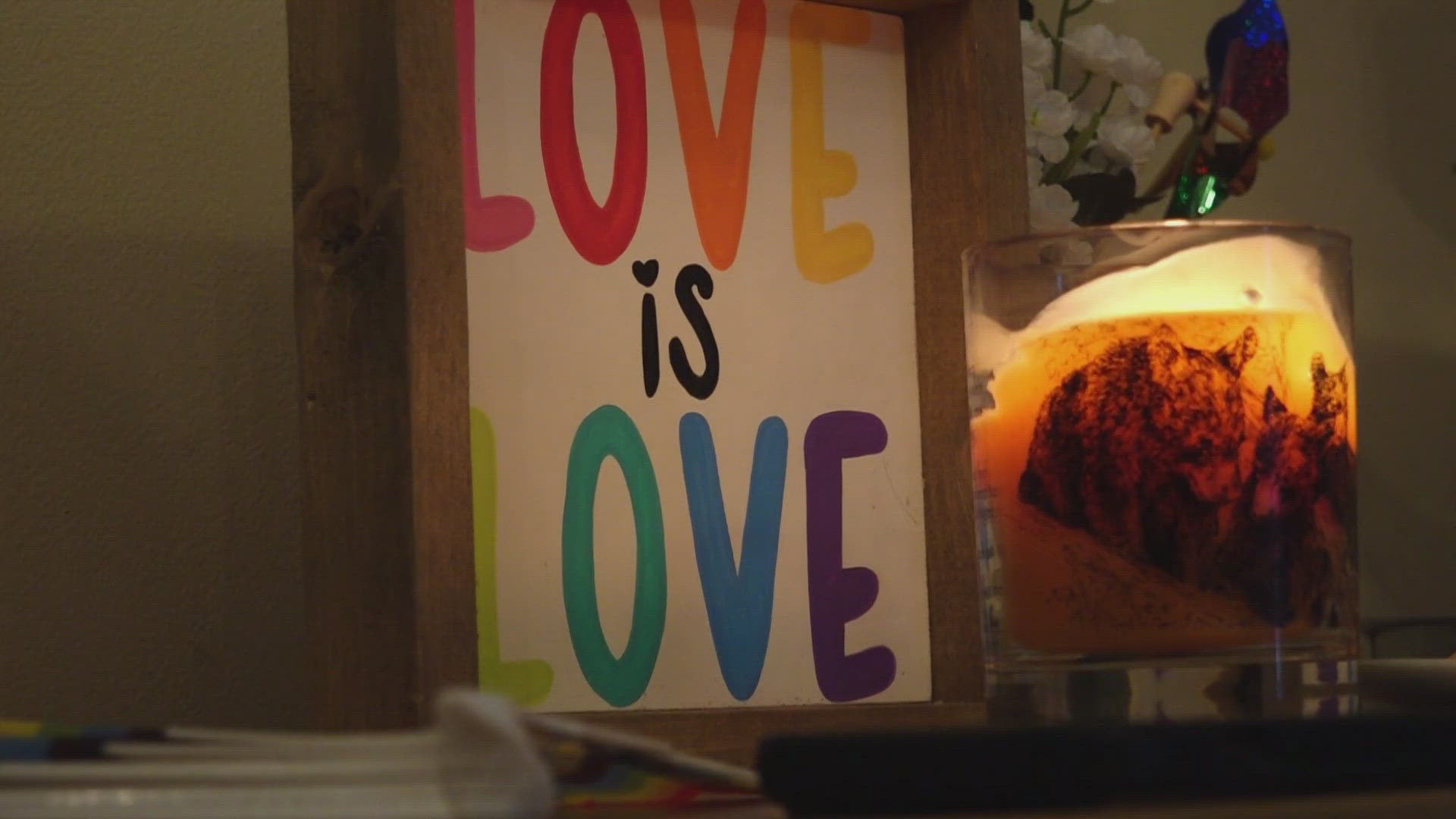KNOXVILLE, Tenn. — At 17 years old, Agape Love came out as a member of the LGBTQ+ community. Love said their decision came after years of intense examination from their family who scoured for signs that they were queer — especially during their teenage years.
"Before I even knew what being gay was, they were already looking at signs that I apparently exhibited, and judging them," they said. "Accusing me of being something that, I didn't even know what it was at the time."
From then on, Love said they wanted to help other teens in the foster care system. Taking in kids and supporting them grew into a dream, one they shared with their wife. Before they even met, the couple said they wanted to help.
"We also just saw the need," they said.
The couple has taken in two children, working to make sure they are loved no matter how they identify.
"They're thrown out only because they want to live in their truth," said Brianna Hanson, the program manager for the Community Action Committee's Youth WINS program. " We do have some that have been sexually abused by relatives, due to them coming out saying that they're LGBTQ. I also had youth come in, and families have completely isolated them. So, they're basically alone. They come here seeking help, connection, and family, and that is what we provide."
The CAC's Youth WINS program focuses on helping young people, between 18 years old and 24 years old, who face homelessness and housing insecurity. The program gives them guidance and helps them find housing, education and job resources.
Hanson said many of the participants of the program were kicked out of their homes after coming out as a member of the LGBTQ+ community.
"It's a struggle for them to feel safe, and like they can express themselves the way they want to," Love said. "Letting them see and be a part of their community and seeing especially that there are adults in the community that are like healthy, sober, living their best life as they grew up into adulthood."
Love gives their foster children a chance to decide which haircuts they want or clothes they want to wear, helping them find safe ways to express their identity. The couple said they want all their foster children to know they are loved, accepted and appreciated. They take them to safe events, including ones hosted by South Press and Knox Pride.
"They let us know their pronouns, they let us know what they wanted to be called. So that was awesome, and we just gave them space to celebrate their identity for the first time. We decorate for Pride, so they love to do that," Love said.
Love hopes to help older children and teens in the foster care system — and Hanson said the system needs more people like Love. She said most families in the foster care system, regardless of whether they are affirming households, want to care for infants.
"We need more LGBTQ+ foster parents. We need it and it should be promoted," said Hanson. "They (most foster care families) want babies. They always want babies. It's definitely difficult for teenagers — especially when they are coming out, trying to figure out who they are."
Hanson also said connecting with homeless LGBTQ+ youth can be difficult for social workers. Many may not openly identify as LGBTQ+ out of fears of discrimination, only revealing they are LGBTQ+ after accessing services.
"A lot of them don't come out — it's hard to track them, it's hard to get data on young adults because they're constantly moving," said Hanson. "It's hard to get them to come in and trust adults and letting them know, 'Hey, this is a safe place to go to.' It has to be word of mouth."
Some LGBTQ+ youth in the Youth WINS program may not have their birth certificates or other vital documents after having to leave home. The program helps them find their birth certificates, social security cards, IDs and more.
"They don't know how to maneuver through the system because of one thing — they're LGBTQ. And it's sad because they are robbed of their ability just to get out here and survive with everybody else," said Hanson.
Recently, the Tennessee legislature passed HB 2169, protecting families who want to become foster parents for children but may not affirm their identities. One attorney who spoke against it as it went through the legislature, Nannette Clark, said the law is open to interpretation.
It went into effect on July 1.
"Don't get me wrong. Tennessee desperately needs foster homes," said Clark. "But, we don't need to be pushing DCS to place an LGBT child in a foster home that is going to give that child additional adverse childhood experiences. They're all already in the system because of abuse and neglect from a biological family."
She said as of January 2023, more than a third of children in the Tennessee foster care system have had three or more placements.
"If you place a child, an LGBTQ child, in a foster home that does not accept them, especially the teenagers — they're going to find a way to get out of that foster home. They may run away. Unfortunately, they may try to attempt suicide," said Clark.
Regardless of Tennessee law, Love said all members of their family are loved.
Anyone interested in becoming a foster parent in Tennessee can reach out online to connect with a support worker, starting the process of welcoming kids who need help into their homes.
The Department of Children's Services also said it works to make sure all children are supported. Its full statement is available below.
"DCS is committed to providing a safe, healthy, and respectful environment for all youth and families served. Our goal always is to make placement decisions consistent with the best interests of the child."

